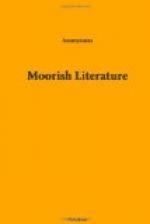“Abenamar, Abenamar,” said
the monarch to the knight,
“A Moor art thou of the Moors, I
trow, and the ladies’ fond delight,
And on the day when first you lay upon
your mother’s breast,
On land and sea was a prodigy, to the
Christians brought unrest;
The sea was still as a ruined mill and
the winds were hushed to rest.
And the broad, broad moon sank down at
noon, red in the stormy west.
If thus thou wert born thou well mayst
scorn to ope those lips of thine,
That out should fly a treacherous lie,
to meet a word of mine.”
“I have not lied,” the Moor
replied, and he bowed his haughty head
Before the King whose wrath might fling
his life among the dead.
“I would not deign with falsehood’s
stain my lineage to betray;
Tho’ for the truth my life, in sooth,
should be the price I pay.
I am son and squire of a Moorish sire,
who with the Christians strove,
And the captive dame of Christian name
was his fair wedded love;
And I a child from that mother mild, who
taught me at her knee
Was ever told to be true and bold with
a tongue that was frank and free,
That the liar’s art and the caitiff
heart would lead to the house of
doom;
And still I must hear my mother dear,
for she speaks to me from the tomb.
Then give me my task, O King, and ask
what question thou mayst choose;
I will give to you the word that is true,
for why should I refuse?”
“I give you grace for your open
face, and the courteous words you use.
What castles are those on the hill where
grows the palm-tree and the
pine?
They are so high that they touch the sky,
and with gold their pinnacles
shine.”
“In the sunset’s fire there
glisten, sire, Alhambra’s tinted tiles;
And somewhat lower Alijire’s tower
upon the vega smiles,
And many a band of subtile hand has wrought
its pillared aisles.
The Moor whose thought and genius wrought
those works for many moons
Received each day a princely pay—five
hundred gold doubloons—
Each day he left his labor deft, his guerdon
was denied;
Nor less he lost than his labor cost when
he his hand applied.
And yonder I see the Generalife with its
orchard green and wide;
There are growing there the apple and
pear that are Granada’s pride.
There shadows fall from the soaring wall
of high Bermeja’s tower;
It has flourished long as a castle strong,
the seat of the Soldan’s
power.”
The King had bent and his ear had lent
to the words the warrior spoke,
And at last he said, as he raised his
head before the crowd of folk:
“I would take thee now with a faithful
vow, Granada for my bride,
King Juan’s Queen would hold, I
ween, a throne and crown of pride;
That very hour I would give thee dower
that well would suit thy will;
Cordova’s town should be thine own,




